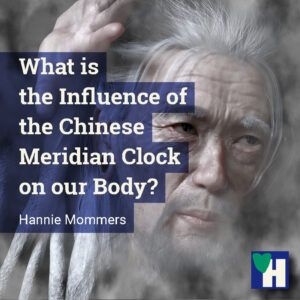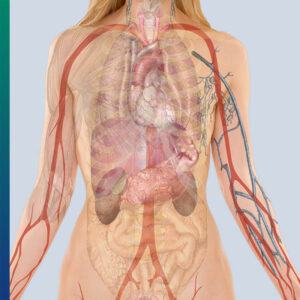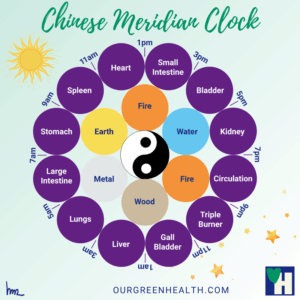
In the article about the Circadian rhythm, I have described an energetic clock that influences our functioning and sleep. Another energetic clock is the Chinese meridian clock. These are two different ways of looking at the same process: the parts of our body influence each other and play a role in our fitness.
The meridians, that the Chinese have distinguished for thousands of years, are a system, not actual lines running through the body.
Chinese healers use the meridians to identify weak spots in the body and to determine their acupuncture points. Sometimes the meridians are linked to organs like the heart, sometimes a meridian is linked to a concept like the Triple burner.
For example, if you always wake up at the same time during the night, it can be useful to see which system that time corresponds with.
Related: What is the Difference between Circadian Rhythm and Biological Clock?
Some of the links are affiliate links. As an affiliate associate, we earn a commission when you purchase any of the products offered through the shared links at no extra cost for you. This helps us maintain this website.
Table of contents
- 1 The Chinese meridian clock explained
- 2 The 12 meridians
- 2.1 Liver, 1 am – 3 am
- 2.2 Lungs, 3 am – 5 am
- 2.3 Large intestine, 5 am – 7 am
- 2.4 Stomach, 7 am – 9 am
- 2.5 Spleen, 9 am – 11 am
- 2.6 Heart, 11 am – 1 pm
- 2.7 Small Intestine, 1 pm – 3 pm
- 2.8 Bladder, 3 pm – 5 pm
- 2.9 Kidney, 5 pm – 7 pm
- 2.10 Circulation, 7 pm – 9 pm
- 2.11 Triple Burner, 9 pm – 11 pm
- 2.12 Gallbladder, 11 pm – 1 am
- 3 What matters is balance
The Chinese meridian clock explained
The meridian clock is also called an organ clock or an energetic clock. This energy determines our health, our energy level, and even our mood.
The Chinese distinguish 12 main meridians. Each organ is optimal and extra active for 2 hours per day. Exactly 12 hours later, the organ is at its weakest.
The main meal is often in the evening in the West, while the stomach is at its weakest according to the meridian clock. That is why the Chinese eat a heavier meal early than we are used to in the morning.
Organs and emotions are connected
The life force, which the Chinese call Chi, flows through the body. If an organ system is active and the accompanying emotion is not or insufficiently expressed, we can experience pain in this organ or our mood can be negative.
You may have experienced nauseousness because of disagreements with family or friends. Or that at certain times you cannot tolerate anything from your children.
How do we interpret the meridian clock?

Some skepticism is in order, I think. Or perhaps we, as laymen, are unable to properly interpret the consequences.
The heart is at its strongest between 11 am and 1 pm. So I would expect most heart attacks to happen in the middle of the night.
Research has shown that most heart attacks happen between 6 a.m. and noon. And also that those are the most dangerous attacks, causing the most damage.
My advice is that if you want to do something with the meridian clock, it is best to consult a certified acupuncturist or Chinese alternative doctor.
Related: The 4 Best Supplements to Help You Sleep at Night
The 12 meridians
Liver, 1 am – 3 am

Our liver is at its strongest around this time and detoxifies our body both physically and mentally. If you are still awake and active with all kinds of things, don’t be surprised by a sudden onset of anger or frustration. This is caused by a disrupted liver energy.
Lungs, 3 am – 5 am
Years ago I did body-centered therapy. I had a burn-out and my sleeping patterns were awful. My therapist was the first to point out the meridian clock to me, noting that I probably had a hidden sadness and therefore always woke up between 3 and 4 am.
It wasn’t until much later that I read more about it. Then I also read that Buddhist monks meditate this early because the lungs are optimal during this period.
Large intestine, 5 am – 7 am
Let go of what is no longer needed. This should be the best time for the ‘number 2’, or as the Dutch call it, ‘the big message’. The large intestine represents feelings of guilt.
Stomach, 7 am – 9 am

As noted above, this is the best time for a nutritious meal. Therefore, 12 hours later (when most are sitting at the dinner table) would be the worst time. The accompanying emotion is disgust.
Spleen, 9 am – 11 am
The spleen represents our intellect. Our breakfast provides the body with enough nutrients to provide energy. Our concentration is the highest but also jealousy and worrying are at their strongest.
Heart, 11 am – 1 pm
When the sun is at its highest point, our heart functions best. As a consequence, our ability to concentrate decreases. Take a break from work for socializing and for a light lunch. The feeling that belongs to the heart-meridian is having fun.
Small Intestine, 1 pm – 3 pm
Our body is digesting lunch, so spend this time doing routine work or exercising. Uncertainty is most common now.
Bladder, 3 pm – 5 pm
Early birds have their afternoon dip a bit earlier, but for many people, the dip falls at this time. Make sure you drink enough liquid and you don’t have a shortage of salt. If you get irritated quickly, you can conclude your bladder meridian is not functioning properly.
Kidney, 5 pm – 7 pm
Our kidneys are now most active in filtering our blood. Back pain or feeling anxious can be a sign that our kidney meridians are disturbed.
Circulation, 7 pm – 9 pm

Make it a quiet time by meditating or reading. The emotion associated with the circulation is ignoring.
Triple Burner, 9 pm – 11 pm
The triple burner is not an organ, but a concept, a kind of energetic system that keeps our body balanced. Prepare to go to bed. Clean up the last things and relax. Make sure you’re not feeling hopeless.
Gallbladder, 11 pm – 1 am
You should be sleeping around this time. The gallbladder is related to making choices. The period of deep sleep is mainly at the beginning of our sleep cycle. Sleep boosts our ability to make choices and boosts our self-confidence unless we feel bitterness.
What matters is balance
The Chinese classify everything according to the principle of the feminine Yin and masculine Yang. Tension and relaxation.
If a meridian is disturbed, the balance can be restored with nutrition. The flavors and type of food are related to the meridians, which in turn are related to the 5 elements fire, wood, earth, water, and metal, as well as Yin and Yang.
Once you dive into this ancient knowledge a whole new world opens up. I am still discovering and am in awe of the wisdom. As said, don’t just make assumptions based on a little bit of knowledge but go to an expert if you want to know more about the Chinese meridian clock.
Do you find this information as intriguing as I do? Let me know in the comment box below.


Interesting. I wonder why I keep waking between 3 and 5 in the morning? I have had this problem for a long time and it makes me feel groggy later in the day. Maybe I need to do my meditation at those hours. I am also interested in the circulation. For a week, I am going to let go of watching Tv and go read a book. Thank you for this information. Sometimes we need a new perspective. I am going to try these indications.
According to Chinese wisdom, it could very well be unresolved sadness. You might find out the source of that by meditating, so it seems to me like an excellent idea to do that around that time.
Not watching TV has several benefits. You won’t get upset by the ongoing stream of bad news. They never bring good news because it seems that is not interesting enough. And the other reason is that the blue light of the screen won’t interfere with your sleep.
I hope you benefit from your intended changes. I would recommend however to do that for a month instead of a week. Changing a habit costs time. Seeing changes cost time as well.
Good luck and take care. Thanks for your comment, JJ.
Hello, Hannie
I’ve never thought there would be so much about the relation between our bodies and the Meridian Clock. It is a very detailed article and an interesting reading. I was not aware of the role The Twelve Meridians play in our emotional dimension. From now on I’ll pay more attention to the “messages” my body sends… Personally, I use acupuncture once or twice a year to solve backaches so I believe in alternative medicine.
Thanks for your post and take good care.
The best part is of course you don’t really need to believe in alternative medicine to get the benefits of it. 🙂 Although believing enforces its capabilities, that is true.
Acupuncture is great. When my mother had nerve pains in her legs I wanted her to go to an acupuncturist. Unfortunately, she didn’t want to. Too unknown, too strange, it scared her. Such a pity, because I really think it would have helped her.
Thanks for your reaction, António, and stay healthy.
Very interesting. For a long time I used to wake up between 3 and 4 am and sometimes even before 3 am, and it drove me nuts, because after I woke up my thoughts started whirring and I couldn’t go back to sleep. So, the Chinese relate this to an underlying sadness. That might well have been the case. I thought that it was due to stress, but the Chinese may have a point with their explanation.
Now I sleep very well.
It was also interesting to read about all the organs, especially the heart and its clock of inactivity. That explains my lethargy around noon.
Yes, isn’t it, Christine? I think it’s really interesting too, especially now I get to know more about the subject.
What I wonder is, why the Chinese had so much wisdom back in the old days and are now such a troubled country. There still is a lot of knowledge, of course. But nowadays they are more known for oppression and counterfeit goods. Such a pity.
I am so glad you sleep well now! And aren’t we all lethargic at some point in the day. 🙂
Thanks for your reaction, Christine, and take care.
No matter how tired I am, I can’t fall asleep before 2 am which leaves me with 4, 5 hours of sleep per night. I can barely function at work and then I come home to two hyper active toddlers #ItsALot
Oof, I can imagine that it’s a lot, Jasmine, or even too much. Have you tried experimenting with the times you go to bed? I used to be an awfully bad sleeper as well and then I tried to change the time I went to bed. One week at 11:30 pm, the next week at 11 pm, and so on until 9 pm. I noted how many hours I slept each night and how I felt the next morning. And in the end, concluded that 10 pm is my time.
I am still not the best of sleepers but it’s way better than it used to be. 🙂
Thanks for your comment and I hope you find a way to get more sleep before you collapse.